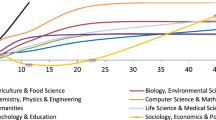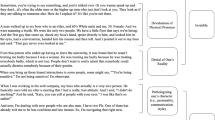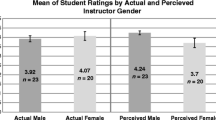Abstract
In this article, we seek to advance the study of vocational gender dynamics by exploring a profession in the midst of a marked shift in gender composition – applied professional psychology. Although this field has historically been dominated by men, the ratio of men to women has drastically shifted (Levant 2011; Willyard 2011). It is within this vocational context that we examine the interplay between masculinity and applied psychological training; specifically, within the student-professional relationships formed by males in U.S. graduate psychology programs. Towards this larger goal, we present a review of existing literature. All studies included in this review are based on U.S. samples unless otherwise noted. We begin with a review of established masculine constructs, and highlight research that has examined these among men working or training within the field of mental health. Next, we present research on student-professional relationships, paying specific attention to studies on advising within applied psychology programs. With this literature review in tow, we discuss the potential advantages and disadvantages of the all-male advisory dyad; these considerations are inclusive to dual theoretical conceptualizations of masculine identity (i.e., deficit model, positivistic model). We also addresses issues that may be raised by multiple cultural identities within these relationships (e.g., race, sexual orientation) with the support of research related to intersectionality. Finally, implications for training, as well as suggestions for future research are offered. Among other conclusions, we assert that applied psychology advisors, and their graduate programs more broadly, attend to aspects of masculinity during training.
Similar content being viewed by others
References
American Psychological Association (2010). APA Commission on Accreditation and APA Office of Program Consultation and Accreditation, Research Committee 2010 Annual Report Online. Retrieved from http://www.apa.org/ed/accreditation/about/research/index.aspx.
American Psychological Association (2009a). 2007 Doctorate employment survey. Data compiled by The Center for Workforce Studies. Retrieved from http://www.apa.org/workforce/publications/07-doc-empl/index.aspx.
American Psychological Association (2009b). 2009 Graduate study in psychology: Faculty and student data. Data compiled by The Center for Workforce Studies. Retrieved from http://www.apa.org/workforce/publications/09-grad-study/index.aspx.
Avery, D. R., Tonidandel, S., & Phillips, M. G. (2008). Similarity on sports sidelines: How mentor–protégé sex similarity affects mentoring. Sex Roles, 58, 72–80. doi:10.1007/s11199-007-9321-2.
Barron, J. M., Struckman-Johnson, C., Quevillon, R. B., & Banka, S. R. (2008). Heterosexual men’s attitudes toward gay men: A hierarchical model including masculinity, openness, and theoretical explanations. Psychology of Men & Masculinity, 9, 154–166. doi:10.1037/1524-9220.9.3.154.
Bergman, S. J. (1995). Men’s psychological development: A relational perspective. In W. S. Pollack & R. F. Levant (Eds.), New psychotherapy for men (pp. 68–90). New York: Wiley.
Bernard, J. M., & Goodyear, R. K. (2004). Fundamentals of clinical supervision (3rd ed.). Boston: Allyn & Bacon.
Blackburn, R. T., Chapman, D. W., & Cameron, S. M. (1981). “Cloning” in academia: Mentorship and academic careers. Research in Higher Education, 15, 315–327. doi:10.1007/BF00973512.
Blanchett, W. J., & Clarke-Yapi, M. D. (1999). Cross-cultural mentoring of ethnic minority students: Implications for increasing minority faculty. The Professional Educator, 22, 49–62.
Blashill, A. J., & Powlishta, K. K. (2009). The impact of sexual orientation and gender role on evaluations of men. Psychology of Men & Masculinity, 10, 160–173. doi:10.1037/a0014583.
Brooks, G. R. (1998). A new psychotherapy for traditional men. San Francisco: Jossey-Bass.
Clawson, J. G., & Kram, K. E. (1984). Managing cross-gender mentoring. Business Horizons, 27, 22–31. doi:10.1016/0007-6813(84)90021-1.
Connell, R. W. (1995). Masculinities. Berkeley: University of California Press.
David, D., & Brannon, R. (Eds.). (1976). The forty-nine percent majority. Reading: Addison-Wesley.
Deemer, E. D., Thomas, D., & Hill, C. L. (2011). Measuring students’ perceptions of faculty competence in professional psychology: Development of the perceived faculty competence inventory. Training and Education in Professional Psychology, 5, 38–47. doi:10.1037/a0021940.
Epstein, C. F. (1970). Encountering the male establishment: Sex-status limits on women’s careers in the professions. Journal of Sociology, 75, 965–982.
Evans, J. (1997). Men in nursing: Issues of gender segregation and hidden advantage. Journal of Advanced Nursing, 26, 226–231. doi:10.1046/j.1365- 2648.1997.1997026226.x.
Franklin, A. J. (1999). Invisibility syndrome and racial identity development in psychotherapy and counseling African American men. The Counseling Psychologist, 27, 761–793. doi:10.1177/0011000099276002.
Gasman, M., Gerstl-Pepin, C., Anderson-Thomkins, S., Rasheed, L., & Hathaway, K. (2004). Negotiating power, developing trust: Transgressing race and status in the academy. Teachers College Record, 106, 689–715. doi:10.1111/j.1467-9620.2004.00355.x.
Gasman, M., Hirschfeld, A., & Vultaggio, J. (2008). “Difficult yet rewarding”: The experiences of African American graduate students in education at an Ivy League institution. Journal of Diversity in Higher Education, 1, 126–138. doi:10.1037/1938-8926.1.2.126.
Golde, C. M. (2000). Should I stay or should I go? Student descriptions of the doctoral attrition process. The Review of Higher Education, 23, 199–227. doi:10.1353/rhe.2000.0004.
Hammer, J. H., & Good, G. E. (2010). Positive Psychology: An empirical examination of beneficial aspects of endorsement of masculine norms. Psychology of Men & Masculinity, 11, 303–318. doi:10.1037/a0019056.
Hart, B. (2009). The future of the psychology workforce - Statistics and trends. Presented at the 117th Annual Convention of the American Psychological Association, Toronto, CA. Retrieved from http://www.apa.org/workforce/presentations/2009-convention.aspx.
Hayes, M. M. (1985). Counselor sex-role values and effects on attitudes toward, and treatment of non-traditional male clients. Dissertation Abstracts International, 45, 3072.
Hill, C., Corbet, C., & St. Rose, A. (2010). Why so few? Women in science, technology engineering, and mathematics. Washington: AAUW.
Holahan, C. K. (1979). Stress experienced by women doctoral students, need for support, and occupational sex typing: An interactional view. Sex Roles, 5, 425–436. doi:10.1007/BF00287318.
Inman, A. G., Schlosser, L. Z., Ladany, N., Howard, E. E., Boyd, D. L., Altman, A., & Stein, E. P. (2011). Advisee nondisclosures in doctoral-level advising relationships. Training and Education in Professional Psychology, 5, 149–159. doi:10.1037/a0024022.
Johnson, W. B. (2002). The intentional mentor: Strategies and guidelines for the practice of mentoring. Professional Psychology: Research and Practice, 33, 88–96. doi:10.1037/0735-7028.33.1.88.
Johnson, W. B. (2007). Transformational supervision: When supervisors mentor. Professional Psychology: Research and Practice, 38, 259–267. doi:10.1037/0735-7028.38.3.259.
Kaufman, M. (1993). Cracking the armour: Power, pain and the lives of men. Toronto: Viking Press.
Kiselica, M. S., & Englar-Carlson, M. (2010). Identifying, affirming, and building upon male strengths: The positive psychology/positive masculinity model of psychotherapy with boys and men. Psychotherapy: Theory, Research & Practice, 47, 276–287. doi:10.1037/a0021159.
Kiselica, M. S., Englar-Carlson, M., Horne, A. M., & Fisher, M. (2008). A positive psychology perspective on helping boys. In M. S. Kiselica, M. Englar-Carlson, & A. M. Horne (Eds.), Counseling troubled boys: A guidebook for practitioners (pp. 31–48). New York: Routledge.
Knox, S., Schlosser, L. Z., Pruitt, N. T., & Hill, C. E. (2006). A qualitative examination of graduate advising relationships: The advisor perspective. The Counseling Psychologist, 34, 489–518. doi:10.1177/0011000006290249.
Levant, R. F. (2011). Research in the psychology of men and masculinity using the gender role strain paradigm as a framework. The American Psychologist, 66, 765–776. doi:10.1037/a0025034.
Levant, R. F., & Pollack, W. S. (1995). A new psychology of men. New York: Basic Books.
Liu, W. M., & Chang, T. (2007). Asian American masculinities. In F. T. L. Leong, A. G. Inman, A. Ebreo, L. H. Yang, L. Kinoshita, & M. Fu (Eds.), Handbook of Asian American psychology (2nd ed.). Thousand Oaks: Sage Publications.
Mahalik, J. R., Cournoyer, R. J., DeFranc, W., Cherry, M., & Napolitano, J. M. (1998). Men’s gender role conflict and use of psychological defenses. Journal of Counseling Psychology, 45, 247–255. doi:10.1037/0022-0167.45.3.247.
Mahalik, J. R., Good, G. E., & Englar-Carlson, M. (2003a). Masculinity scripts, presenting concerns, and help seeking: Implications for practice and training. Professional Psychology: Research and Practice, 34, 123–131. doi:10.1037/0735-7028.34.2.123.
Mahalik, J. R., Locke, B. D., Ludlow, L. H., Deimer, M. A., Scott, R. P. J., Gottfried, M., & Freitas, G. (2003b). Development of the conformity to masculine norms inventory. Psychology of Men & Masculinity, 4, 3–25. doi:10.1037/1524-9220.4.1.3.
McDermott, R. C., & Schwartz, J. P. (2013). Toward a better understanding of emerging adult men’s Gender Role Journeys: Differences in age, education, race, relationship status, and sexual orientation. Psychology of Men & Masculinity, 14, 202–210. doi:10.1037/a0028538.
Mintz, L. B., & O’Neil, J. M. (1990). Gender roles, sex, and the process of psychotherapy: Many questions and few answers. Journal of Counseling and Development, 68, 381–387. doi:10.1002/j.1556-6676.1990.tb02515.x.
Moss-Racusin, C. A., Phelan, J. E., & Rudman, L. A. (2010). When men break the gender rules: Status incongruity and backlash against modest men. Psychology of Men & Masculinity, 11, 140–151. doi:10.1037/a0018093.
Nilsson, J. E., & Duan, C. (2007). Experiences of prejudice, role difficulties, and counseling self- efficacy among U.S. racial and ethnic minority students working with White supervisors. Journal of Multicultural Counseling and Development, 35, 219–229. doi:10.1002/j.2161-1912.2007.tb00062.x.
O’Neil, J. M. (2008). Summarizing 25 years of research on men’s gender role conflict using the Gender Role Conflict Scale: New research paradigms and clinical implications. The Counseling Psychologist, 36, 358–445. doi:10.1177/0011000008317057.
O’Neil, J. M., & Egan, J. (1992). Men’s gender role transitions over the life span: Transformations and fears of femininity. Journal of Mental Health Counseling, 14, 305–324.
O’Neil, J. M., Good, G. E., & Holmes, S. (1995). Fifteen years of theory and research on men’s gender role conflict: New paradigms for empirical research. In R. F. Levant & W. S. Pollack (Eds.), A new psychology of men (pp. 164–206). New York: Basic Books.
Patton, L. D., & Harper, S. R. (2003). Mentoring relationships among African American women in graduate and professional schools. New Directions for Student Services, 2003, 67–78. doi:10.1002/ss.108
Pleck, J. (1981). The myth of masculinity. Cambridge: MIT Press.
Plummer, D. (1999). One of the boys: Masculinity, homophobia, and modern manhood. New York: Haworth Press.
Ponterotto, J. G., Gretchen, D., Utsey, S. O., Riger, B. P., & Austin, R. (2002). A revision of the multicultural counseling awareness scale. Journal of Multicultural Counseling and Development, 30, 153–181. doi:10.1002/j.2161-1912.2002.tb00489.
Pope-Davis, D. B., Stone, G. L., & Nielson, D. (1997). Factors influencing the stated career goals of minority graduate students in counseling psychology programs. The Counseling Psychologist, 25, 683–698. doi:10.1177/0011000097254010.
Rice, K. G., Choi, C., Zhang, Y., Villegas, J., Ye, H. J., Anderson, D., & Bigler, M. (2009). International student perspectives on graduate advising relationships. Journal of Counseling Psychology, 56, 376–391. doi:10.1037/a0015905.
Sanchez, F. J., Liu, W. M., Leathers, L., Goins, J., & Vilain, E. (2011). The subjective experience of social class and upward mobility among African American men in graduate school. Psychology of Men & Masculinity, 12, 368–382. doi:10.1037/a0024057.
Sbaratta, C. A. T. (2012). Male psychology doctoral students: The impact of GRC on training. Dissertation Abstracts International: Section B: The Sciences and Engineering, 72(11-B), 7023.
Schaffer, E. S., Marx, D. M., & Prislin, R. (2013). Mind the gap: Framing of women’s success and representation in STEM affects women’s math performance under threat. Sex Roles, 68, 454–463. doi:10.1007/s11199-012-0252-1.
Schlosser, L. Z., & Foley, P. F. (2008). Ethical issues in multicultural student-faculty mentoring relationships in higher education. Mentoring and Tutoring: Partnership in Learning, 16, 63–75. doi:10.1080/13611260701801015.
Schlosser, L. Z., & Gelso, C. J. (2001). Measuring the working alliance in advisor-advisee relationships in graduate school. Journal of Counseling Psychology, 48, 157–167. doi:10.1037/0022-0167.48.2.157.
Schlosser, L. Z., & Gelso, C. J. (2005). The advisory working alliance inventory – advisor version: Scale development and validation. Journal of Counseling Psychology, 52, 650–654. doi:10.1037/0022-0167.52.4.650.
Schlosser, L. Z., & Kahn, J. H. (2007). Dyadic perspectives on advisor-advisee relationships in counseling psychology doctoral programs. Journal of Counseling Psychology, 54, 211–217. doi:10.1037/0022-0167.54.2.211.
Schlosser, L. Z., Knox, S., Moskovitz, A. R., & Hill, C. E. (2003). A qualitative study of the graduate advising relationship: The advisee perspective. Journal of Counseling Psychology, 50, 178–188. doi:10.1037/0022-0167.50.2.178.
Schlosser, L. Z., Lyons, H. Z., Talleyrand, R. M., Kim, B. S. K., & Johnson, W. B. (2011a). Advisor-advisee relationships in graduate training programs. Journal of Career Development, 38, 3–18. doi:10.1177/0894845309358887.
Schlosser, L. Z., Lyons, H. Z., Talleyrand, R. M., Kim, B. S. K., & Johnson, W. B. (2011b). A Multiculturally-infused model of graduate advising relationships. Journal of Career Development, 38, 44–61. doi:10.1177/0894845309359286.
Schlosser, L. Z., Lyons, H. Z., Talleyrand, R. M., Kim, B. S. K., & Johnson, W. B. (2011c). Multicultural issues in graduate advising relationships. Journal of Career Development, 38, 19–43. doi:10.1177/0894845309359285.
Schope, R. D., & Eliason, M. J. (2004). Sissies and tomboys: Gender role behaviors and homophobia. Journal of Gay and Lesbian Social Services: Issues in Practice, Policy, and Research, 16(2), 73–97. doi:10.1300/j041v16n02_05.
Sells, J. N., Goodyear, R. K., Lichtenberg, J. W., & Polkinghorne, D. E. (1997). Relationship of supervisor and trainee gender to in-session verbal behavior and ratings of trainee skills. Journal of Counseling Psychology, 44, 406–412. doi:10.1037/0022-0167.44.4.406.
Steele, C. M. (1999). A threat is in the air: How stereotypes shape intellectual identity and performance. In E. Lowe Jr. (Ed.), Promise and Dilemma (pp. 92–128). Princeton: Princeton University Press.
Steele, C. M. (2010). Whistling Vivaldi: How stereotypes affect us and what we can do. New York: W. W. Norton.
Stewart, A. J., & McDermott, C. (2004). Gender in psychology. Annual Review of Psychology, 55, 519–544. doi:10.1146/annurev.psych.55.090902.141537.
Sue, D. W., & Sue, D. (2003). Counseling the culturally diverse: Theory and practice (4th ed.). New York: John Wiley.
Szymanski, D. M., & Ikizler, A. S. (2013). Internalized heterosexism as a mediator in the relationship between Gender Role Conflict, heterosexist discrimination, and depression among sexual minority men. Psychology of Men & Masculinity, 14, 211–219. doi:10.1037/a0027787.
Thompson, E. H., Pleck, J. H., & Ferrera, D. L. (1992). Men and masculinities: Scales for masculinity ideology and masculinity-related constructs. Sex Roles, 27, 573–607. doi:10.1007/BF02651094.
Tirpak, D. M., & Lee, S. S. (2012). Navigating graduate student peer-to-peer multiple relationships in professional psychology. Training and Education in Professional Psychology, 6, 135–141. doi:10.1037/a0029234.
Watkins, C. E. (1995). Psychotherapy supervisor and supervisee: Developmental models and research 9 years later. Clinical Psychology Review, 15, 647–680. doi:10.1016/0272-7358(95)00038-Q.
Watkins, C. E. (1997). Handbook of psychotherapy supervision. New York: Wiley.
Wei, M., Tsai, P. C., Chao, R. C. L., Du, Y., & Li, S. P. (2012). Advisory Working Alliance, perceived English proficiency, and acculturative stress. Journal of Counseling Psychology, 59, 437–448. doi:10.1037/a0028617.
Wester, S. R. (2008). Male Gender Role Conflict and multiculturalism: Implications for counseling psychology. The Counseling Psychologist, 36, 294–324. doi:10.1177/0011000006286341.
Wester, S. R., Christianson, H. F., Vogel, D. L., & Wei, M. (2007). Gender role conflict and psychological distress: The role of social support. Psychology of Men & Masculinity, 8, 215–224. doi:10.1037/1524-9220.8.4.215.
Wester, S. R., & Vogel, D. L. (2002). Working with the masculine mystique: Male gender role conflict, counseling self-efficacy and the training of male psychologists. Professional Psychology: Research and Practice, 33, 370–376. doi:10.1037/0735-7028.33.4.370.
Wester, S. R., Vogel, D. L., & Archer, J. (2004). Male restricted emotionality and counseling supervision. Journal of Counseling and Development, 82, 91–98. doi:10.1002/j.1556-6678.2004.tb00289.x.
Wester, S. R., Vogel, D. L., Pressly, P. K., & Heesacker, M. (2002). Sex differences in emotion: A critical review of the literature and implications for counseling psychology. The Counseling Psychologist, 30, 629–651. doi:10.1177/00100002030004008.
Williams-Nickelson, C. (2009). Mentoring women graduate students: A model for professional psychology. Professional Psychology: Research and Practice, 40, 284–291. doi:10.1037/a0012450.
Willyard, C. (2011). Men: A growing minority? gradPsych Magazine, 9, 40.
Wisch, A. F., & Mahalik, J. R. (1999). Male therapists’ clinical bias: Influence of client gender roles and therapist gender role conflict. Journal of Counseling Psychology, 46, 51–60. doi:10.1037/0022-0167.46.1.51.
Wong, Y. J., Owen, J., Tran, K. K., Collins, D., & Higgins, C. (2012). Asian American male college students’ perceptions of people’s stereotypes about Asian American men. The Psychology of Men and Masculinity, 13, 77–85. doi:10.1037/a0022800.
Author information
Authors and Affiliations
Corresponding author
Rights and permissions
About this article
Cite this article
Sbaratta, C.A., Tirpak, D.M. & Schlosser, L.Z. Male-Male Advising Relationships in Graduate Psychology: A Diminishing Dyad. Sex Roles 72, 335–348 (2015). https://doi.org/10.1007/s11199-015-0466-0
Published:
Issue Date:
DOI: https://doi.org/10.1007/s11199-015-0466-0




